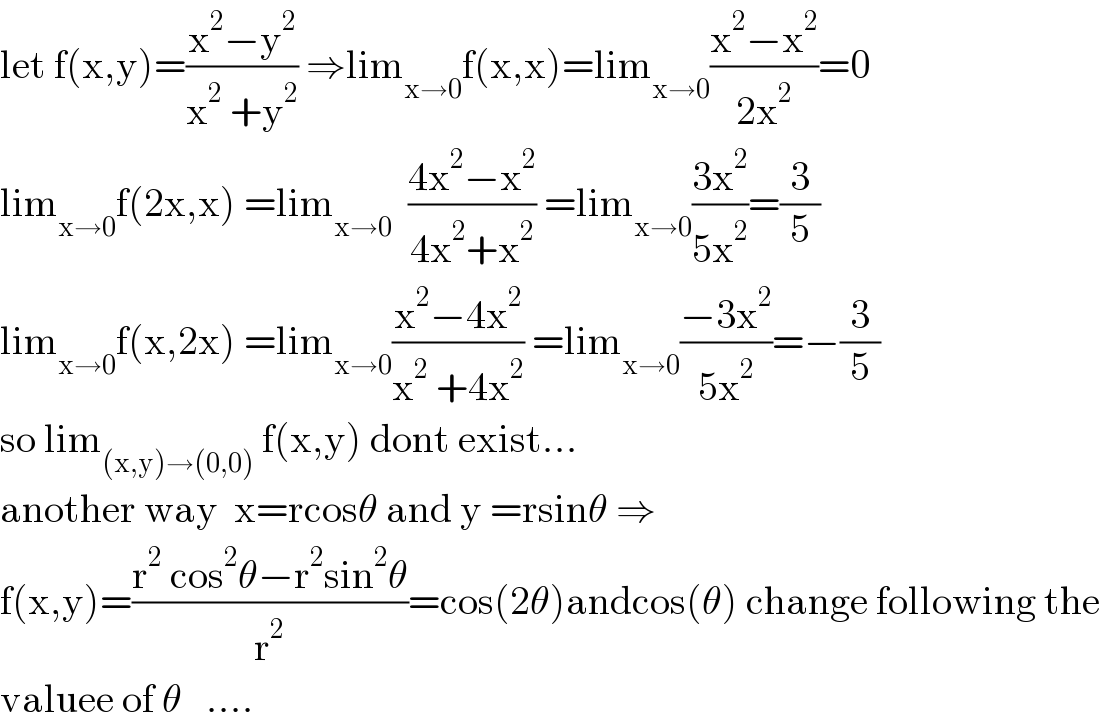
Question Number 130696 by LYKA last updated on 28/Jan/21

Answered by mathmax by abdo last updated on 28/Jan/21

$$\mathrm{let}\:\mathrm{f}\left(\mathrm{x},\mathrm{y}\right)=\frac{\mathrm{x}^{\mathrm{2}} −\mathrm{y}^{\mathrm{2}} }{\mathrm{x}^{\mathrm{2}} \:+\mathrm{y}^{\mathrm{2}} }\:\Rightarrow\mathrm{lim}_{\mathrm{x}\rightarrow\mathrm{0}} \mathrm{f}\left(\mathrm{x},\mathrm{x}\right)=\mathrm{lim}_{\mathrm{x}\rightarrow\mathrm{0}} \frac{\mathrm{x}^{\mathrm{2}} −\mathrm{x}^{\mathrm{2}} }{\mathrm{2x}^{\mathrm{2}} }=\mathrm{0} \\ $$$$\mathrm{lim}_{\mathrm{x}\rightarrow\mathrm{0}} \mathrm{f}\left(\mathrm{2x},\mathrm{x}\right)\:=\mathrm{lim}_{\mathrm{x}\rightarrow\mathrm{0}} \:\:\frac{\mathrm{4x}^{\mathrm{2}} −\mathrm{x}^{\mathrm{2}} }{\mathrm{4x}^{\mathrm{2}} +\mathrm{x}^{\mathrm{2}} }\:=\mathrm{lim}_{\mathrm{x}\rightarrow\mathrm{0}} \frac{\mathrm{3x}^{\mathrm{2}} }{\mathrm{5x}^{\mathrm{2}} }=\frac{\mathrm{3}}{\mathrm{5}} \\ $$$$\mathrm{lim}_{\mathrm{x}\rightarrow\mathrm{0}} \mathrm{f}\left(\mathrm{x},\mathrm{2x}\right)\:=\mathrm{lim}_{\mathrm{x}\rightarrow\mathrm{0}} \frac{\mathrm{x}^{\mathrm{2}} −\mathrm{4x}^{\mathrm{2}} }{\mathrm{x}^{\mathrm{2}} \:+\mathrm{4x}^{\mathrm{2}} }\:=\mathrm{lim}_{\mathrm{x}\rightarrow\mathrm{0}} \frac{−\mathrm{3x}^{\mathrm{2}} }{\mathrm{5x}^{\mathrm{2}} }=−\frac{\mathrm{3}}{\mathrm{5}} \\ $$$$\mathrm{so}\:\mathrm{lim}_{\left(\mathrm{x},\mathrm{y}\right)\rightarrow\left(\mathrm{0},\mathrm{0}\right)} \:\mathrm{f}\left(\mathrm{x},\mathrm{y}\right)\:\mathrm{dont}\:\mathrm{exist}... \\ $$$$\mathrm{another}\:\mathrm{way}\:\:\mathrm{x}=\mathrm{rcos}\theta\:\mathrm{and}\:\mathrm{y}\:=\mathrm{rsin}\theta\:\Rightarrow \\ $$$$\mathrm{f}\left(\mathrm{x},\mathrm{y}\right)=\frac{\mathrm{r}^{\mathrm{2}} \:\mathrm{cos}^{\mathrm{2}} \theta−\mathrm{r}^{\mathrm{2}} \mathrm{sin}^{\mathrm{2}} \theta}{\mathrm{r}^{\mathrm{2}} }=\mathrm{cos}\left(\mathrm{2}\theta\right)\mathrm{andcos}\left(\theta\right)\:\mathrm{change}\:\mathrm{following}\:\mathrm{the}\: \\ $$$$\mathrm{valuee}\:\mathrm{of}\:\theta\:\:\:.... \\ $$
